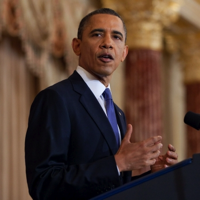When President Barack Obama addressed the world's Muslims from Cairo in 2009, his message, to put it bluntly, added up to, "Please love America -- or at least stop hating it." Two years later, when Obama took the podium once again to address the restive Middle East, his message was much different, but just as stark. This time he seemed to be saying, "Please believe that America still matters."
Obama's May 19 speech from the State Department in Washington represented a desperate attempt at relevance. The president was essentially trying to demonstrate that during this transformative phase in the region, the United States still speaks with a voice that must be heard -- and with a power that can help shape the world. It was the uneasy cry of a superpower startled by global events, trying to regain a place of leadership and influence in a pivotal part of the world.
Obama was quick to acknowledge that the U.S. had acted as little more than an observer when the ground started shaking in the Middle East. "It's not America," he said, "that put people into the streets of Tunis or Cairo." After more than four months spent struggling to come up with a coherent response to the Arab uprisings, Obama revealed an America that above all hopes to avoid becoming a marginal player. "The question before us," he confessed, "is what role America will play as this story unfolds."

